- From $199 USDUnit price /Unavailable
Description

- The Chinese Snake (Curved) cucumber produces fruits that are smooth, dark-green with white spines
- The fruits grow to about 15" to 18" long and curved
- Grows on strong & vigorous vines
-
Days to Maturity | 75 days
-
Cucumber Seeds | Grow cucumbers where a long, warm growing season, minimum 65 days, can be assured. Plant seeds where there is ample space and vines can sprawl, the simplest way is to plant cucumbers in hills.
Click here for complete Cucumber grow guide
- The Chinese Snake (Curved) cucumber produces fruits that are smooth, dark-green with white spines
Tomato - Pineapple (Indeterminate)
From $299 USDUnit price /UnavailableDescription

With its fruity, tropical notes, the Pineapple Tomato is the one you want to invite to your next luau. This 1-2 lb slicer is ready for a party in its bright yellow dress with orange-red marbling that continues straight through to the flesh. Throw a sweet, golden slice on a burger or mix it with an actual pineapple for a festive salsa. One of the most beautiful, best-tasting Beefsteak Tomatoes you can grow.- Low acidity
- Small seed core
- Sweet and fruity, tropical notes
- Slow to ripen
SEED PLANTING INFO
- Botanical name: Solanum lycopersicum
- Growth type: Indeterminate, trellis support, regular pruning
- Tomato size: Large (1-2 lbs.)
- Depth to plant seeds: .25" deep
- Spacing between plants: 24"-36" apart
- Spacing between rows: 36"-48" apart
- Days to germinate (sprout): 7-14 days
- Germination soil temps: 75F-95F
- Soil needs: 6.0-6.5 pH
- Sun needs: Full sun
- Frost hardy: No
- Planting season: Spring, summer
- # of plants per sq. ft.: Appx. 1 plant per 3 sq. ft.
- Days to maturity: 85-95 days
Click here to view our full Tomato grow guide
Good companion plants: Basil, Borage, Onion, Parsley, Pepper
Pepper (Hot) - NuMex, Twilight 🔥🔥🔥 (HYBRID)
From $199 USDUnit price /UnavailableDescription
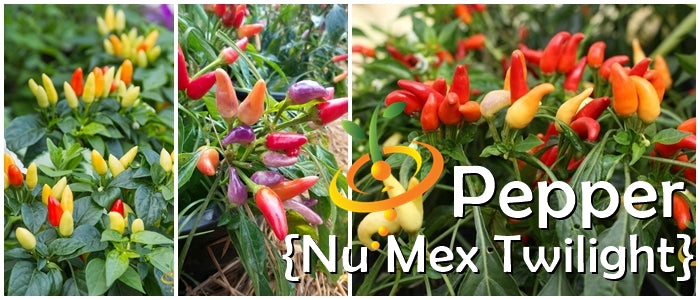
The NuMex Twilight Pepper may be slow to mature, but when it does, it’s full of surprises. Small 2" fruits start out purple rather than green, then ripen through yellow, orange, and red. The peppers point up toward the sky, like flowers, and all four colors adorn the compact 1'-2' plant at the same time, turning this edible ornamental into a living bouquet of salty, slightly bitter peppers so blistering hot, you’ll want to report them to the sheriff. Plant several close together as a border, or grow one in a special pot on the patio. Use as you would any other criminally hot pepper.- Very high yields
- Edible ornamental
- Salty, slightly bitter flavor
- Good for containers
SEED PLANTING TIPS
- Botanical name: Capsicum annuum
- Pepper length: 1"-2"
- Scoville heat units (SHU): 30,000-50,000/hot
- Plant support: None
- Depth to plant seeds: 1/8" deep
- Spacing between plants: 6"-12" apart
- Spacing between rows: 18"-24" apart
- Days to germinate (sprout): 7-21 days
- Germination soil temps: 75F-85F
- Soil needs: 6.0-7.0 pH
- Sun needs: Full sun
- Frost hardy: No
- Planting season: Spring, summer
- # of plants per sq. ft.: Appx. 2-4 plants per sq. ft.
- Days to maturity: 90-120 days
Good companion plants: Basil, Carrot, Cucumber, Eggplant, Okra, Rosemary, Sage, Squash, Tomato
All Peppers ⟐ Hot Peppers 📚 Hot Peppers Grow Guide Nasturtium - Alaska Mix Flowers
From $299 USDUnit price /UnavailableDescription
This variety includes a mix of gold, salmon, orange, and deep red/purple colored flowers.
- Nasturtium flowers are one of the most popular edible flowers grown in home gardens. The petals have a slight peppery taste, and the seeds and leaves are also edible! You can even use the seeds as an alternative to capers.
- Not only are the flowers pretty, Nasturtiums are great companion plants! They are also known to deter aphids, whiteflies, cucumber beetles & more. Learn more >
- Nasturtiums should be planted in the spring for a "summer show". Plant in full sun, and in sandy, well drained soil. Generally, the poorer the soil quality, the more flowers the plant will produce! Deadhead your plants regularly to encourage new blooms, all season long. These flowers will self-seed resulting in more flowers for years to come!
- These are PERFECT for beginner gardeners! These annuals are very easy to grow from seed and can be grown just about anywhere, even places that are susceptible to drought.
- The bright flower petals will liven up any garden, with very little effort! They are also GREAT for planting in hanging baskets or containers.
Wildflowers - Annual Cut Flower Scatter Garden Seed Mix
From $499 USDUnit price /UnavailableDescription
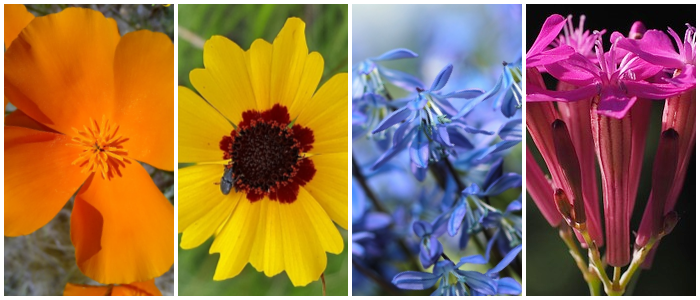 Includes a mix of 25 popular annual flower varieties that will produce a beautiful assortment of flowers suitable for cutting. The mix includes many of the flowers found in floral stores. This annual flower mix will blossom all-year-long creating a bountiful source of flowers.
Includes a mix of 25 popular annual flower varieties that will produce a beautiful assortment of flowers suitable for cutting. The mix includes many of the flowers found in floral stores. This annual flower mix will blossom all-year-long creating a bountiful source of flowers. Scatter this mix of seeds in your garden for the most beautiful assortment of flowers you've ever seen.
Wildflower establishment requires some important steps:- Site selection/preparation: It's important to address competition from weeds: pull, till, or use organic herbicides. If planting in the spring/summer you can wait for weeds to germinate, control and then plant the wildflower seeds.
- Seeding: You will want to have good seed to soil contact, broadcasting by hand is a good approach on small plot, may want to mix with an inert carrier, sand or other. Raking in and covering with soil 2-3 times seed thickness.
- Watering: During establishment for the first month, can be from rain in spring or supplement with irrigation.
- Timing: The best time to plant is in spring to early summer and even again in late fall.
This mix includes all of the following seed varieties:GENUS/SPECIES
COMMON NAME
TYPE
HEIGHT
COLOR

Callistephus chinensis
Aster
A
12 to 36
Blue/Pink/White/Purple

Calendual officinalis
Pot Marigold
A
12 to 24
Yellow/Orange/Cream

Centaurea cyanus
Bachelor Button, Polka Dot Mix
A
12 to 36
Mix

Clarkia amoena
Godetia
A
8 to14
Pink/White

Clarkia elegans
Clarkia
A
18 to 30
Pink/Lavender

Coreopsis tinctoria
Plains Coreopsis
A
12 to 36
Yellow-Maroon

Cosmos bipinnatus
Cosmos, Dwarf Sensation
A
36 to 60
White/Pink/Crimson/Rose

Cynoglossum firmament
Chinese Forget Me Not
A/B
18 to 24
Blue

Delphinium ajacis
Larkspur
A
12 to 36
White/Pink/Blue/Violet

Dimorphotheca aurantiaca
African Daisy
A
8 to16
Orange/Salmon/White

Eschscholzia californica
Poppy, Mission Bells
TP
12 to 18
Yellow/Orange

Gaillardia pulchella
Annual Gaillardia
A
12 to 24
Yellow-Red

Gypsophila elegans
Baby's Breath
A
8 to 18
White

Helianthus annuus
Sunflower
A
24 to 72
Yellow

Helichrysum monstrosum
Strawflower mixed
A
24 to 36
Yellow/White/Red/Pink

Iberis umbellata
Candytuft
A
12 to 18
White/Pink/Violet

Lavateria trimestris mix
Tree mallow
A
24 to 48
White/Pink

Lobularia maritima
Alyssum, tall Sweet
TP
8 to 16
White

Oenotheria lamarckiana
Evening Primrose
B/P
24 to 60
Yellow

Papaver rhoeas
Shirley Poppy
A
12 to 30
White/Pink/red

Phacelia campanularia
California Bluebells
A
8 to 20
Blue

Rubeckia hirta
Black Eyed Susan
A/B/P
12 to 36
Yellow

Silene armeria
Catchfly
A/B
16 to 22
Pink

Tagetes erecta
Marigold
A
12 to 16
Yellow/Orange/Maroon

Zinnia elegans
Zinnia
A
12 to 36
White/Purple/Yellow/Orange.Red
A-Annual
75%
B-Biennial
18%
TP-Tender Perennial
7%
Pepper (Hot) - Scotch Bonnet, Yellow 🔥🔥🔥
From $329 USDUnit price /UnavailableDescription

If you’ve ever wondered if the sun has a flavor, the Yellow Scotch Bonnet Pepper is your answer. This deeply lobed fruit that resembles the folds of a Scottish cap is sweet and fruity, and hot enough to break a wild horse. The generous plant produces 1"-2" fruits that ripen from green to yellow to yellower. This sunny little pepper is a key ingredient in Jamaican foods for unique flavor and scorching heat, and can easily ignite all of your recipes.
- High yields
- Sweet, fruity flavor
- Harvest any color
- Good for containers
SEED PLANTING TIPS
- Botanical name: Capsicum chinense
- Pepper length: 1"-2"
- Scoville heat units (SHU): 100,000-350,000/hot
- Plant support: Tomato cage or stake
- Depth to plant seeds: .25" deep
- Spacing between plants: 18"-24" apart
- Spacing between rows: 24"-36" apart
- Days to germinate (sprout): 7-21 days
- Germination soil temps: 75F-85F
- Soil needs: 6.0-7.0 pH
- Sun needs: Full sun
- Frost hardy: No
- Planting season: Spring, summer
- # of plants per sq. ft.: Appx. 1 plant per sq. ft.
- Days to maturity: 90-120 days
Good companion plants: Basil, Carrot, Cucumber, Eggplant, Okra, Rosemary, Sage, Squash, Tomato
All Peppers ⟐ Hot Peppers 📚 Hot Peppers Grow Guide Radicchio - Classic Red (Italian Chicory)
From $299 USDUnit price /UnavailableDescription

- Radicchio is sometimes also referred to as the Italian chicory
- They're grown as a leaf vegetable
- White-veined red leaves
- Excellent grilled or roasted
- How to Grow Organic Radicchio from Seed
-
Days to Maturity | 65 days
- Radicchio is sometimes also referred to as the Italian chicory
- From $299 USDUnit price /Unavailable
Description

- The Mizuna mustard is a vigorous grower, which produces numerous stalks bearing dark green, deeply cut and fringed leaves
- They have a fresh, crisp taste and can be used on their own or cooked with meat
- This mustard variety is highly resistant to cold and grows well during the winter months
-
Days to Maturity | 50 days
-
Mustard Seeds | When growing from seed, start them outdoors 3 weeks before the last frost. Plant seeds a 1/2" deep, and thin to 3 inches.
Click here for complete Mustard grow guide
Additional DetailsMustard is high in Vitamin A, B, and C. Mustard greens are very popular in the southern U.S. where they are generally slow-cooked with ham hocks or other smoked-pork products. Asian cuisines generally use mustard greens pickled or stir-fried.
- The Mizuna mustard is a vigorous grower, which produces numerous stalks bearing dark green, deeply cut and fringed leaves
- From $299 USDUnit price /Unavailable
Description

-
A traditional Southern favorite
- Plant produces good yields of green mustard leaves
- Excellent flavor
- Makes a great garnish to any dish
- Easy to grow
-
Days to Maturity | 35 days
-
Mustard Seeds | When growing from seed, start them outdoors 3 weeks before the last frost. Plant seeds a 1/2" deep, and thin to 3 inches.
Click here for complete Mustard grow guide
Additional DetailsMustard is high in Vitamin A, B, and C. Mustard greens are very popular in the southern U.S. where they are generally slow-cooked with ham hocks or other smoked-pork products. Asian cuisines generally use mustard greens pickled or stir-fried.
-
A traditional Southern favorite
- From $299 USDUnit price /Unavailable
Description

- Slender tapered root is 4" to 5" long with crisp, mild, white flesh
- Extremely easy to grow
- Grows well in small spaces & containers
- Days to Maturity | 30-40 days
Additional DetailsRadishes are rich in ascorbic acid, folic acid, and potassium. They are a good source of vitamin B6, riboflavin, magnesium, copper, and calcium. One cup of sliced red radish bulbs provides approximately 20 calories, largely from carbohydrates
Follow SeedsNow.com's board Radishes on Pinterest. - Slender tapered root is 4" to 5" long with crisp, mild, white flesh
- From $199 USDUnit price /Unavailable
Description

-
The Ruby Red Swiss Chard is an extremely prolific plant that is a very popular variety for home growers. The plant grows to about 2' tall and produces some of the most amazing looking swiss chard leaves in a deep shade of ruby red
- Perfect if you're into juicing your swiss chard leaves
- Great to saute and/or steam
- Excellent as a salad
- Plant yields all summer long into the fall months
- Extremely healthy
- Easy to grow
-
Days to Maturity | 65 days
Additional DetailsSwiss chard is high in vitamins A, K and C, with a 175g serving containing 214%, 716%, and 53%, respectively, of the recommended daily value. It is also rich in minerals, dietary fiber and protein.
-
The Ruby Red Swiss Chard is an extremely prolific plant that is a very popular variety for home growers. The plant grows to about 2' tall and produces some of the most amazing looking swiss chard leaves in a deep shade of ruby red
- From $299 USDUnit price /Unavailable
Description
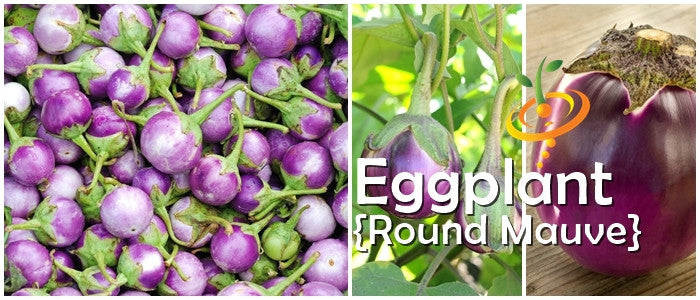
- This heirloom variety produces a beautiful round mauve eggplant with thin skin and a beautiful white flesh
- Best picked with the eggplant is the size of a tennis ball
- Perfect for container gardening
-
Days to Maturity | 80-90 days
-
Eggplant Seeds | Start seed indoors to allow at least 10 weeks for young plants to develop. Plant in rows 3 feet apart, with 2 feet between plants.
Click here for complete Eggplant grow guide
- This heirloom variety produces a beautiful round mauve eggplant with thin skin and a beautiful white flesh
- From $299 USDUnit price /Unavailable
Description

The Henderson Lima Bean is an old heirloom with a reputation for easy growth and high yields of small, but plump pods and beans. This is one bean that requires higher temperatures for best production. Raw beans are toxic, so enjoy its smooth, creamy, buttery flavor after cooking, either shelled or dried. This compact bush-type plant spreads wider than green beans, so give them room to grow.
- Easy to grow
- Bush growth habit
- Heat loving
- Superb flavor
SEED PLANTING TIPS
- Botanical name: Phaseolus lunatus
- Depth to plant seeds: 1.5" deep
- Spacing between plants: 6"-8" apart
- Spacing between rows: 24"-30" apart
- Days to germinate (sprout): 10-21 days
- Germination soil temps: 70F-90F
- Soil needs: 6.0-7.0 pH
- Sun needs: Full sun
- Frost hardy: No
- Planting season: Spring, summer, fall
- # of plants per sq. ft.: Appx. 2-4 plants per sq. ft.
- Days to maturity: 65-75 days
Click here to view our full Bean grow guide.
Good companion plants: Cucumber, Pea, Rosemary, Thyme, Tomato
- From $199 USDUnit price /Unavailable
Description
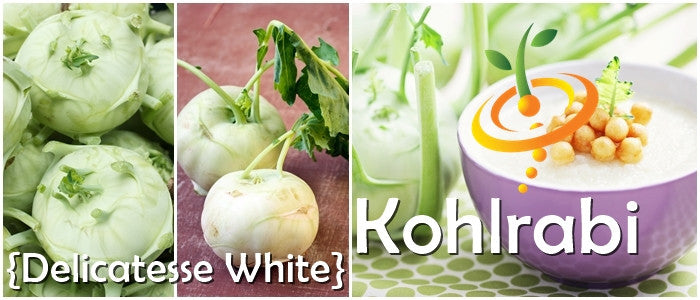
- This Kohlrabi variety produces extremely tender round bulbs
- Kohlrabi looks like a turnip growing above-ground
- Best to harvest when bulbs reach 4" across
- Well known for uniform size and disease resistance
-
Days to Maturity | 55-60 days
-
Kohlrabi Seeds | Grow Kohlrabi in loose, average soil. Direct-sow your seeds 4 to 6 weeks before the last frost in your growing zone; about ¼ inch deep, and 10 seeds per foot.
Click here for complete Kohlrabi grow guide
Additional Detail
Kohlrabi is one of the most commonly eaten vegetables in Kashmir Locally called monj, the vegetable is eaten along with the leaves (haakh). A Kashmiri household may have this on their dinner or lunch plates three to four times a week.
- This Kohlrabi variety produces extremely tender round bulbs
Milkweed, Tropical (Silky Deep Red/Blood Flower) Flowers
From $299 USDUnit price /UnavailableDescription
Silky Deep Red Tropical Milkweed (Asclepias curassavica), also called Blood Flower, is striking in the garden and is a vital host plant for the endangered monarch butterfly. This easy care bushy perennial reseeds easily, isn’t fussy about soil or water, and can grow just about anywhere. Puts out bright, showy 2"-4" flower clusters in brilliant red-orange with yellow centers on slender stems that grow 2'-3' tall. Blooms continuously summer through fall, providing migrating monarchs with nectar snacks for their long journey and a place to lay their eggs. Can be grown as an annual in cooler grow zones. Lovely and long-lasting in cut flower arrangements.
- Life cycle: Herbaceous perennial
- Bloom season: Summer, fall
- Attracts: Beneficial insects, hummingbirds, bees, butterflies, and other pollinators
- Flower meaning: Dignity, freedom, rejection, remembrance, solitude
As a medicinal plant, Milkweed has been used internally to treat diarrhea, gonorrhea, intestinal parasites and worms, pneumonia, spleen inflammation, and stomach tumors, and externally to treat bleeding, boils, corns, dermatitis, eye infections, ringworm, skin parasites, snakebites, sores, warts, and wounds.
⚠️ Although Milkweed is known to be safe when used correctly, all parts of the plant are toxic and may even cause death to people, pets, horses, and livestock if ingested in large quantities. The milky sap is a skin irritant. Do not ingest while pregnant or nursing.
⚠️ Medicinal properties are presented as information only, and are not a recommendation or prescription for use. Consult a medical professional before using any plant medicinally.
NOTE: A parasite, Ophryocystis elektroscirrha (OE), travels with monarchs and is deposited on every plant they visit. In warm grow zones where this non-native milkweed does not die back from a killing frost, the OE parasite can build up and harm the caterpillars that feed on the leaves and the butterflies they become. A continuously blooming milkweed may also encourage the monarchs to dally rather than migrate, which interrupts their reproductive cycle. It’s easy to eliminate both dangers, by cutting your plants to the ground at least once per season.
SEED PLANTING TIPS
- Botanical name: Asclepias curassavica
- Hardiness zones: 8-11
- Planting season: Spring, fall
- Days to maturity: 100-120 days
- Cold stratify: No
- Depth to plant seeds: 1/4" deep - Soaking seeds in warm water overnight aids germination.
- Spacing between plants: 1'-2' apart
- Days to germinate (sprout): 10-21 days
- Germination soil temps: 60F-70F
- Soil types: Clay, caliche, sandy, loamy, silty, rocky, chalky, rich, dry, moist, wet
- Soil pH: 6.1-7.5
- Water needs: Average
- Sun needs: Full sun, part shade
- Frost tolerant: No
- Drought tolerant: Yes
- Deer resistant: Yes
More facts about Milkweed:
- The beautiful monarch butterflies rely on milkweed to lay their eggs upon. Sadly, habitats that naturally support monarchs are becoming fewer in number each year. New urban development & chemically treated "big agriculture" are destroying habitats of milkweed all over the United States.
- Sow in early January for first year blooms.
Melon (Honeydew)- Orange Flesh
From $299 USDUnit price /UnavailableDescription

- This is a delicious melon with a sweet orange flesh
-
Days to Maturity | 85-100 days
-
Melon Seeds | Because of the long growing season, start plants indoors 4 to 5 weeks before outdoor planting time. Direct sow 4-5 seeds in a hill and then thin to the appropriate spacing.
Click here for complete Melon grow guide
Pepper (Hot) - Devil's Tongue, Yellow 🔥🔥🔥🔥🔥
From $399 USDUnit price /UnavailableDescription
The Yellow Devil’s Tongue pepper plants produce legions of 2"-3" tapered fruits that wrinkle and ripen from light green to bright yellow to golden yellow, and have a sweet, citrusy flavor. If you’re tempted to set your own tongue ablaze and have idle hands, push up some daisies and plant this pepper. Makes a scorching hot sauce or wicked pickles.- High yields
- Sweet, citrusy flavor
- Harvest any color
- Good for containers
SEED PLANTING TIPS
- Botanical name: Capsicum chinense
- Pepper length: 2"-3"
- Scoville heat units (SHU): 300,000-500,000/extra hot
- Plant support: Tomato cage or stake
- Depth to plant seeds: .25" deep
- Spacing between plants: 18"-24" apart
- Spacing between rows: 24"-36" apart
- Days to germinate (sprout): 7-21 days
- Germination soil temps: 75F-85F
- Soil needs: 6.0-7.0 pH
- Sun needs: Full sun
- Frost hardy: No
- Planting season: Spring, summer
- # of plants per sq. ft.: Appx. 1 plant per sq. ft.
- Days to maturity: 90-110 days
Good companion plants: Basil, Carrot, Cucumber, Eggplant, Okra, Rosemary, Sage, Squash, Tomato
- One plant can produce hundreds of peppers!
All Peppers ⟐ Hot Peppers 📚 Hot Peppers Grow Guide - From $299 USDUnit price /Unavailable
Description
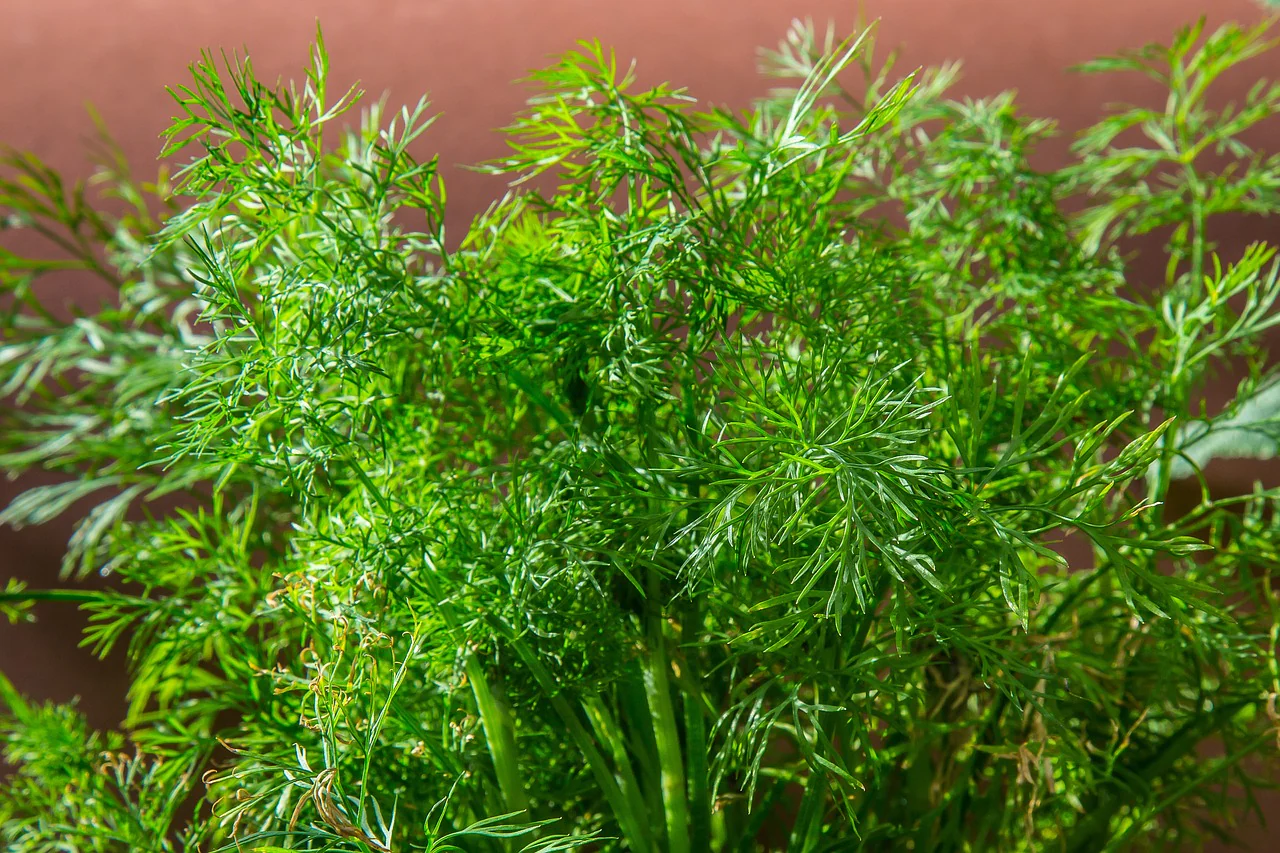
- Dukat dill is a particularly fine plant with amazing flavor and large heads. If you like dill you will love to try this new variety in your garden
- This variety is darker than most other dill varieties.
- Excellent fresh or dried.
- Grown for homemade dill pickles.
- Can be grown in containers, raised beds, and any other location in full sun.
- Annual plant.
- Adds great flavor and color to many culinary creations.
Additional Details
Dill has a very long history of herbal use going back more than 2,000 years. The seeds are a common and very effective household remedy for a wide range of digestive problems. An infusion is especially efficacious in treating gripe in babies and flatulence in young children. The seed is aromatic, carminative, mildly diuretic, galactogogue, stimulant and stomachic.
Other Medicinal Properties
Dill is also used in the form of an extracted essential oil. Used either in an infusion, or by eating the seed whole, the essential oil in the seed relieves intestinal spasms and griping, helping to settle colic. Chewing the seed improves bad breath. Dill is also a useful addition to cough, cold and flu remedies, it can be used with antispasmodics such as Viburnum opulus to relieve period pains. Dill will also help to increase the flow of milk in nursing mothers and will then be taken by the baby in the milk to help prevent colic.
See Dill Recipes & Growing Tips on our Pinterest Board
Follow SeedsNow.com's board Dill on Pinterest. - Dukat dill is a particularly fine plant with amazing flavor and large heads. If you like dill you will love to try this new variety in your garden
- From $299 USDUnit price /Unavailable
Description

- The Giant Red mustard is a full-flavored mustard green
- The bright purple-tinted leaves and green midribs add color and zest to salads and sandwiches
-
Dasy to Maturity | 50 days
-
Mustard Seeds | When growing from seed, start them outdoors 3 weeks before the last frost. Plant seeds a 1/2" deep, and thin to 3 inches.
Click here for complete Mustard grow guide
Additional DetailsMustard is high in Vitamin A, B, and C. Mustard greens are very popular in the southern U.S. where they are generally slow-cooked with ham hocks or other smoked-pork products. Asian cuisines generally use mustard greens pickled or stir-fried.
- The Giant Red mustard is a full-flavored mustard green
Pepper (Hot) - Habanero, Lemon 🔥🔥🔥🔥
From $299 USDUnit price /UnavailableDescription

Yellow like the sun and hot as blazes describes the Lemon Habanero Pepper. If that scares you, there’s a Yellow Banana Pepper and a cup of milk waiting for you in the nursery. Everyone else can pull up a chair to the big kids’ table. This prolific plant produces lots of 2" wrinkled, waxy fruits that ripen from bright green to bright yellow to smoky golden yellow. The fruity fragrance draws you in, the citrusy flavor sits you down, and then 200,000-300,000 Scoville heat units (SHUs) of pure heat blaze across your tongue. Where’d you say that milk is again?
- Very high yields
- Fruity and citrusy
- Hot enough to make a cow go meow
- Good for containers
SEED PLANTING TIPS
- Botanical name: Capsicum chinense
- Pepper length: 1"-2"
- Scoville heat units (SHU): 200,000-300,000/very hot
- Plant support: Tomato cage or stake
- Depth to plant seeds: .25" deep
- Spacing between plants: 18"-24" apart
- Spacing between rows: 24"-36" apart
- Days to germinate (sprout): 10-30 days
- Germination soil temps: 75F-85F
- Soil needs: 5.0-6.0 pH
- Sun needs: Full sun
- Frost hardy: No
- Planting season: Spring, summer
- # of plants per sq. ft.: Appx. 1 plant per sq. ft.
- Days to maturity: 85-105 days
Good companion plants: Basil, Carrot, Cucumber, Eggplant, Okra, Rosemary, Sage, Squash, TomatoAll Peppers ⟐ Hot Peppers 📚 Hot Peppers Grow Guide - From $299 USDUnit price /Unavailable
Description

- Mild, sweet, onion-like flavor
- A very hardy variety
- Blue-green leaves resemble giant scallions
-
Days to Maturity | 100 days
-
Leek Seeds | Plant leeks in the spring, and late in the summer or fall. Plant leek seedlings 8-10 inches apart
Click here for complete Leek grow guide
- Mild, sweet, onion-like flavor
- From $299 USDUnit price /Unavailable
Description

-
These seeds produces a large drumhead cabbage.
- Large heads are bluish green
- Suitable for spring, summer, and fall crops
- Very cold hardy
- Stores well. Suitable for home gardens and market growers.
- Perfect for Kraut recipes
-
Days to Maturity | 100 days
-
Cabbage Seeds | Cabbage is an annual cool-season crop, hardy to frost and light freezes. Plant in rows 2 1/2 feet apart, with 12-16 inches between plants.
Click here for complete Cabbage grow guide
Additional Details
Did you know? Cabbage is an excellent source of vitamin C! It also contains significant amounts of glutamine, an amino acid that has anti-inflammatory properties. Cabbage can also be included in dieting programs, as it is a low calorie food.
-
These seeds produces a large drumhead cabbage.
- From $099 USDUnit price /Unavailable
Description
- The Tatsoi mustard produces dark green spoon shaped leaves
- Popular oriental green
- Excellent for hydroponic systems
- Highly resistant to cold and grows well during the winter months
-
Days to Maturity | 55 days
- Click here for complete Mustard grow guide
Additional DetailsMustard is high in Vitamin A, B, and C. Mustard greens are very popular in the southern U.S. where they are generally slow-cooked with ham hocks or other smoked-pork products. Asian cuisines generally use mustard greens pickled or stir-fried.
- The Tatsoi mustard produces dark green spoon shaped leaves
Corn Salad (Mache - Lamb's Lettuce) - Dutch
From $199 USDUnit price /UnavailableDescription
-
Valerianella locusta (aka Corn Salad) is a small annual plant that is eaten as a leaf vegetable. It has a characteristic nutty flavor, dark green color, and soft texture, and is popularly served as salad greens. //Wikipedia
- Corn Salad has a delicate flavor, similar to a butterhead lettuce. It is quite hardy and requires very little care while remaining practically free of pests & disease. Corn salad is also known for growing vigorously in almost any soil!
- We think Corn Salad tastes best right out of the garden with a light drizzle of olive oil and a squeeze of fresh lemon. Once you try this cold-hardy green, you'll be sure to make it a staple in your fall/winter gardens every year.
-
Day to Maturity | only 40 days
-
Valerianella locusta (aka Corn Salad) is a small annual plant that is eaten as a leaf vegetable. It has a characteristic nutty flavor, dark green color, and soft texture, and is popularly served as salad greens. //Wikipedia
- From $099 USDUnit price /Unavailable
Description

-
Member of the squash family. Produces an assortment of small gourds of various shapes, sizes, and colors
- Excellent for making crafts, birdhouses, dippers, and ornaments
- Great for arts & crafs projects
- The hard-rinded fruits can have carving done to create scenes raised in relief, painting, and wood burning are also used to decorate the shells
-
Member of the squash family. Produces an assortment of small gourds of various shapes, sizes, and colors
All-in-One Heritage Tomato Garden Variety Pack
$3999 USD$4499Unit price /UnavailableDescription
All-in-One Tomato Variety Pack includes an assortment of our 15 most popular tomato seed varieties. Seeds are all individually packaged. Packaged with zip-lock bag system for long-term storage and maximum seed protection.
- Zipper-top closure and bottom fold
- Resealable
Includes all of the following varieties:
1. Beefsteak (Ponderosa Red) (Appx. 15 seeds)
-
The Ponderosa Red Beefsteak Tomato produces meaty, bright red fruit with mild, sweet flavor. This low-acid ribbed slicer has very few seeds, so there’s more flesh to savor. Strong vines support heavy production, so stake well. Eat them any way you can think of.
- 75-80 days to maturity

2. Black Krim (Appx. 15 seeds)
- The Black Krim Tomato is as unusual as it is flavorful. Hailing from the Black Sea region of Russia, this robust tomato ripens to a unique mix of deep brown shoulders atop smoky red bodies with reddish-green flesh. Reliably produces ½-1lb fruits with a rich, slightly salty flavor. Dress up a sandwich or cook up a Khrenovina sauce.
- 75-80 days to maturity

3. Bonny Best (Appx. 15 seeds)
- The Bonny Best Tomato has a century-old reputation as a canning and ketchup tomato due to its small seed core, acidity, and firm texture, but it’s secretly great as a fresh slicer. This high-yielder produces picture-perfect medium, round, bright red fruits with hearty flavor. A great all-around tomato with many flavorful uses.
- 75-80 days to maturity
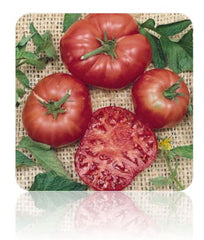
4. Brandywine Pink (Appx. 15 seeds)
-
The Pink Brandywine Tomato has lightly ribbed shoulders and potato-leaf foliage. Whether that’s the reason no two are alike, only the tomato knows. The vigorous vine takes its time to ripen the 1-2 lb blushing pink fruit with a small seed core. A beautiful slicer with a sweet, tangy flavor to look forward to late in the season.
-
85-90 days to maturity

5. Cherokee Purple (Appx. 10 seeds)
- With deep purple shoulders and a dusky pink body, the Cherokee Purple Tomato is a stunner in the garden. Slice open this beefsteak to reveal red flesh tinged with purple, brown, and green. Low acidity and sweet, slightly smoky flavor has made this a favorite of tomato lovers for more than 130 years. Will this be the year it becomes your favorite?
-
70-90 days to maturity
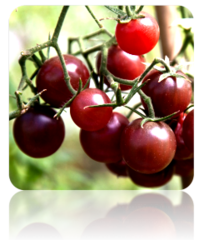
6. Cherry Chocolate (Appx. 15 seeds)
- The Black Cherry Tomato is a rather mysterious one. But first let us tell you about its well-known attributes. It produces large clusters of small, uniformly round 1" fruits with rich, sweet flavor. The mystery is whether these little gems will ripen to an onyx, mahogany, or amethyst color in your particular growing conditions.
- 75-80 days to maturity

7. Homestead (Appx. 15 seeds)
- On any productive homestead, every member needs to pull its weight, and the Homestead Tomato out-tomatoes every tomato. Sun up to sun down, in high heat and humidity, this workhorse churns out large, red, smooth, sturdy, meaty, juicy slicers. As comfortable in the overalls of a sandwich as it is done up in its Sunday best for the canner. Just a good ol’ heirloom with good old-fashioned tomato flavor.
- 75-80 days to maturity
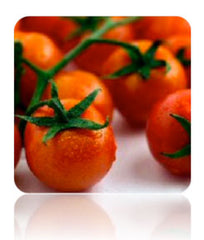
8. Large Red Cherry (Appx. 15 seeds)
- If we were going to write a short intro about the Large Red Cherry Tomato, we wouldn’t describe them as “cute little things,” decorating your garden like “heavy clusters of small, ruby jewels” that are “bursting with sweet flavor,” and suggest you “mix them with Black Cherry Tomatoes for an ode to a ladybug." No. We would write it in the bullet points, like this:
- Cute little things
- Clusters of small, ruby jewels
- Sweet flavor
- Mix with Black Cherry Tomatoes for an ode to a ladybug 🐞

9. Rio Grande (Appx. 15 seeds)
- The Rio Grande Tomato is a classic plum/paste tomato that gets along with heat, humidity, and drought, but that’s only one of its maravilloso qualities. The plant produces muchos bright red, egg-shaped fruits with a flavor that’s well-balanced between dulce and acidic. Especially bueno for pastes and sauces, but it wouldn’t mind being chopped up into fresh pico de gallo with a little onion, jalapeño, and cilantro.
- 75-80 days to maturity
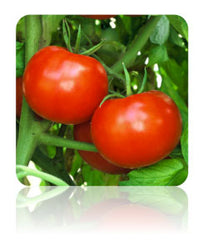
10. Rutgers (Appx. 15 seeds)
-
The Rutgers Tomato has all the best tomato qualities—medium tomato size, smooth tomato skin, bright red tomato color, slightly flattened tomato shape, old-fashioned tomato flavor, compact tomato plant, reliable tomato production, generous tomato yields, and kind to animals. A tomato you can take home to meet the family.
-
75-80 days to maturity

11. Small Red Cherry (Appx. 15 seeds)
- The Small Red Cherry Tomato produces small red cherry tomatoes. Not Large Red Cherry Tomatoes. Small ones and lots of them. Small, like ½" small. Bursting with flavor
- 70-80 days to maturity

12. Red Pear
- With a history as old as America herself, the Red Pear Tomato has been a delicious tradition in thousands of gardens. Vigorous vines are loaded with hundreds of small, sweet pear-shaped fruits with a nice acidic bite. Early maturity is a bonus for Northern zones with a short growing season. Try roasting or pickling them for your Fourth of July celebration.
- 75-80 days to maturity
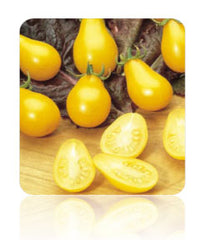
13. Yellow Pear (Appx. 15 seeds)
- We don’t say this about a lot of tomatoes, but the Yellow Pear Tomato really should be grown in every garden. We also don’t say this about a lot of tomatoes: It’s prolific. Ripens loads of lemon-yellow, pear-shaped 1"-2" fruits that are delicious straight off the vine. Keep a few empty bags on-hand to fill up and share these sweet, mild flavor bombs with friends and neighbors.
- 75-80 days to maturity

14. Roma (Appx. 15 seeds)
- The Roma Tomato is the quintessential plum/paste tomato. Light on seeds and juice, it has thick fruit walls and dense flesh that holds onto seasonings and spices. Ever so good cooked into a thick sauce or paste, canned, or pureed. Compact plants produce meaty, egg-shaped fruits that are sweet and tangy. Skip the flavorless ones at the grocery store and grow your own Romas this summer.
- 75-85 days to maturity

15. VR Moscow (Appx. 15 seeds)
- The VR Moscow Tomato was created by Utah State University to thrive in vast intermountain regions, and named after Moscow, Idaho. Vigorous vines produce very respectable 1-2 lb. fruits that are a vivid red. This very robust beefsteak slicer with thick walls and juicy flesh offers voluptuous, rich, old-fashioned tomato flavor. A valuable recipe ingredient for canning, pastes, and sauces, and viscerally responsive to salt and pepper.
- 80-90 days to maturity
Watermelon - Moon & Stars (Yellow-flesh)
From $349 USDUnit price /UnavailableDescription
- The Moon & Stars Watermelon dark green rind and bright yellow spots
- Yellow spots are very unique and can be small or large in size
- All American classic heirloom watermelon - Deep yellow flesh
- Grows over 40 lbs
-
Days to Maturity | 90 days
-
Watermelons are heat-loving plants that need lots of sun. They grow on a long vine, so make sure to give them plenty of space to roam around.
- The Moon & Stars Watermelon dark green rind and bright yellow spots
Endive - Broadleaf, Full Heart Batavian
From $299 USDUnit price /UnavailableDescription

-
This plant produces excellent yields of dark green curly leaves with large tender crisp ribs
- An excellent choice for salads greens
- Endive is rich in many vitamins and minerals, especially in folate and vitamins A and K, and is high in fiber
- Days to Maturity | 80-90 days
-
This plant produces excellent yields of dark green curly leaves with large tender crisp ribs
Cardoon (Purple Artichoke Thistle)
From $299 USDUnit price /UnavailableDescription
 Cardoon is an artichoke thistle. It has become an extremely important medicinal herb in recent years following the discovery of cynarin.
Cardoon is an artichoke thistle. It has become an extremely important medicinal herb in recent years following the discovery of cynarin.
The cardoon is related to the Globe artichoke.
Cardoons are recognized as a good source of potassium, calcium and iron. Artichoke oil, which is similar to sunflower or safflower oil, can be extracted from the seeds.
Cardoons can be baked, braised or boiled, and it's often a good idea to blanch them for up to 30 minutes before using them. Watch-out! Beware of sneaky thistles that may be lurking on the outer stalks -- (it's best to peel the outside a bit.)Cardoons are excellent fried! Try them simmered in broth, or added to a stew. If you're a cheesemaker, the purple stamens of the cardoon flower can be used to make vegetarian rennet!
See Cardoon Recipes & Growing Tips on our Pinterest Board
- From $199 USDUnit price /Unavailable
Description
- Plant produces good yields of egg shaped tomatoes.
- The tomatoes are the size and shape of an egg.
- A firm tomato that keeps well. Does well in poor growing conditions.
SEED PLANTING TIPS
- Botanical name: Solanum lycopersicum
- Growth type: Indeterminate, trellis support, regular pruning
- Tomato size: Small
- Depth to plant seeds: 1/8" deep
- Spacing between plants: 24" apart
- Spacing between rows: 36"-48" apart
- Days to germinate (sprout): 7-14 days
- Germination soil temps: 75F-95F
- Soil needs: 6.0-6.5 pH
- Sun needs: Full sun
- Frost hardy: No
- Planting season: Spring, summer
- # of plants per sq. ft.: Appx. 1 plant per 2 sq. ft.
- Days to maturity: 75-80 days
Click here to view our full Tomato grow guide
Good companion plants: Basil, Borage, Onion, Parsley, Pepper
- Plant produces good yields of egg shaped tomatoes.
Wildflowers - Beneficial Insect Garden Seed Mix
From $499 USDUnit price /UnavailableDescription
 Plant this mix to attract beneficial insects such as ladybugs, lacewings, ground beetles and other insects that feed on pests.
Plant this mix to attract beneficial insects such as ladybugs, lacewings, ground beetles and other insects that feed on pests.
Wildflower establishment requires some important steps:- Site selection/preparation: It's important to address competition from weeds: pull, till, or use organic herbicides. If planting in the spring/summer you can wait for weeds to germinate, control and then plant the wildflower seeds.
- Seeding: You will want to have good seed to soil contact, broadcasting by hand is a good approach on small plot, may want to mix with an inert carrier, sand or other. Raking in and covering with soil 2-3 times seed thickness.
- Watering: During establishment for the first month, can be from rain in spring or supplement with irrigation.
- Timing: The best time to plant is in spring to early summer and even again in late fall.
This mix includes all of the following seed varieties:GENUS/SPECIES
COMMON NAME
TYPE
HEIGHT
COLOR

Achillea millefolium
White Yarrow
P
12 to 36
White

Gypsophila elegans
Baby's Breath
A
8 to 18
White

Iberis umbellata
Candytuft
A
12 to 18
White/Pink/Violet

Layia platyglossa
Tidy Tips
A
6 to 12
Yellow-White

Lobularia maritima
Alyssum
TP
8 to 16
White

Nemophila menziesii
Baby Blue Eyes
A
4 to 12
Blue

Phacelia campanularia
California Bluebells
A
8 to 20
Blue

Trifolium repens
White Dutch Clover
P
4 to 10
White
Annual
50%
Perennial
50%
Pepper (Hot) - Pretty Purple 🔥🔥🔥🔥
From $329 USDUnit price /UnavailableDescription

An edible ornamental, the Pretty Purple Pepper loves an audience. Compact plants produce an ensemble of 1"-2" tapered fruits that lift their tips in a glorious chorus line of mini rockets, going through several costume changes in green, purple, yellow, orange, and red. The show goes on when you bite into one. With a searing purple heat in tune with the Habaneros and the Scotch Bonnets, you’ll be singing and dancing in your own Broadway musical. Assemble several plants to choreograph a border, or give one the spotlight in a nice container/pot, and let it audition for your next spicy production.The Purple Cayenne Pepper is just as purple and pretty, but with less drama.
- High yields
- Edible ornamental
- Harvest any color
- Good for containers
SEED PLANTING TIPS
- Botanical name: Capsicum annuum
- Pepper length: 1"-2"
- Scoville heat units (SHU): 200,000-350,000/very hot
- Plant support: None - they support each other
- Depth to plant seeds: 1/8" deep
- Spacing between plants: 6"-12" apart
- Spacing between rows: 18"-24" apart
- Days to germinate (sprout): 7-21 days
- Germination soil temps: 75F-85F
- Soil needs: 6.0-7.0 pH
- Sun needs: Full sun
- Frost hardy: No
- Planting season: Spring, summer
- # of plants per sq. ft.: Appx. 2-4 plants per sq. ft.
- Days to maturity: 90-120 days
Good companion plants: Basil, Carrot, Cucumber, Eggplant, Okra, Rosemary, Sage, Squash, Tomato
All Peppers ⟐ Hot Peppers 📚 Hot Peppers Grow Guide - From $299 USDUnit price /Unavailable
Description

- Endive is a healthy and delicious leafy green. The Green Curled Endive plant produces dark green curly leaves with large tender crisp ribs
- Excellent salads and sandwiches
- Also boiled or steamed
- Extremely easy to grow
- Endive is rich in many vitamins and minerals, especially in folate and vitamins A and K, and is high in fiber
- Days to Maturity | 90 days
- Endive is a healthy and delicious leafy green. The Green Curled Endive plant produces dark green curly leaves with large tender crisp ribs
- From $299 USDUnit price /Unavailable
Description
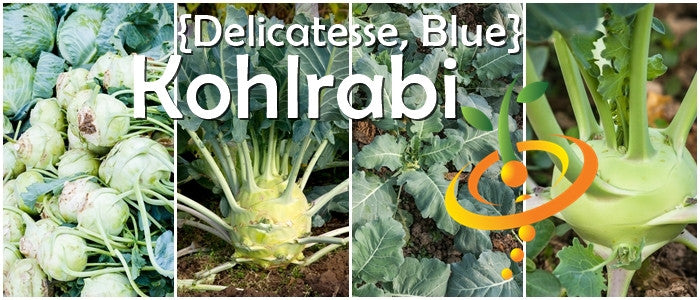
- This Kohlrabi variety produces extremely tender round bulbs
- Best to harvest when bulbs reach 4" across
- Well known for uniform size and disease resistance
- Kohlrabi looks like a turnip growing above-ground
-
Days to Maturity | 55-60 days
-
Kohlrabi Seeds | Grow Kohlrabi in loose, average soil. Direct-sow your seeds 4 to 6 weeks before the last frost in your growing zone; about ¼ inch deep, and 10 seeds per foot.
Click here for complete Kohlrabi grow guide
Kohlrabi is one of the most commonly eaten vegetables in Kashmir. Locally called monj, the vegetable is eaten along with the leaves (haakh). A Kashmiri household may have this on their dinner or lunch plates three to four times a week.
- This Kohlrabi variety produces extremely tender round bulbs
- From $399 USDUnit price /Unavailable
Description

- Levisticum officinale. Perennial.
- Plant produces glossy dark green leaves that have a flavor similar to Celery.
- Known for the treatment of digestive problems
- A teaspoon of Lovage seeds, steeped in Brandy, strained and sweetened with sugar is on old remedy for settling an upset stomach
- Plant Height: 80" tall
- Days to Maturity | 85 days
- Levisticum officinale. Perennial.
- From $199 USDUnit price /Unavailable
Description
- Perennial
- Low growing plant produces green leaves
- Used in salads and cooked like spinach
- Purslane is said to be effective in treatment of insect or snake bites on the skin, boils, sores, pain from bee stings, bacillary dysentery, diarrhea, hemorrhoids, postpartum bleeding, and intestinal bleeding
- Plant grows in poor soil and tolerates drought
⚠️ Always consult with your doctor and primary care provider before using or consuming herbs, flowers, seeds and/or plants for medicinal purposes.
- From $249 USDUnit price /Unavailable
Description
Yellow Canary Swiss Chard
-
The Yellow Canary Swiss Chard is a popular plant that produces some of the most amazing looking swiss chard leaves in a bright shades of yellow.
- Perfect for salads or steamed greens.
- One of this years most popular varieties to grow.
- Extremely healthy.
- Easy to grow.
-
Day to Maturity | 65 days
Additional DetailsSwiss chard is high in vitamins A, K and C, with a 175g serving containing 214%, 716%, and 53%, respectively, of the recommended daily value. It is also rich in minerals, dietary fiber and protein.
-
The Yellow Canary Swiss Chard is a popular plant that produces some of the most amazing looking swiss chard leaves in a bright shades of yellow.
Sprouts/Microgreens - Barley Grass
From $399 USDUnit price /UnavailableDescription

- Organic.
- Known as the the famous nutritious Super Green supplement.
- It is even more nutritious in the form of raw juice.
- Ideal for juicing.
- Can be ground up for Barley flour and bread.
- Extremely healthy and nutritious.
- Days to Harvest | Barley grass will be ready to harvest in appx. 6 to 10 days
- Organic.
Onion - Walla Walla Sweet (Long Day)
From $299 USDUnit price /UnavailableDescription

- The Walla Walla Sweet Onion variety will produces a globed shaped white onion
- Bulbs can reach 2 lbs
- This is one of the most popular Long day onion varieties available
- Easy to grow
- Perfect for beginners
- Grows well in containers and tight spaces
-
Days to Maturity | 110-120 days
Onion Seeds | Onions are easy to grow, have a fairly short growing period and take up little space in the garden. Plant onions 1/4 inch deep and 3 to 4 inches apart in double rows, leaving 6 to 10 inches between rows.
Click here for complete Onion grow guide
- The Walla Walla Sweet Onion variety will produces a globed shaped white onion
- From $299 USDUnit price /Unavailable
Description

- Produces deep purple radishes with a white flesh
- Looks incredible! Great for culinary dishes
- The white flesh is sweet and mild in flavor
- Great for selling at farmers markets
- Unique and rare heirloom radish
- Grows well in containers and small spaces
-
Days to Maturity | 25-30 days
Additional Details
Radishes are rich in ascorbic acid, folic acid, and potassium. They are a good source of vitamin B6, riboflavin, magnesium, copper, and calcium. One cup of sliced red radish bulbs provides approximately 20 calories, largely from carbohydrates
Follow SeedsNow.com's board Radishes on Pinterest. - Produces deep purple radishes with a white flesh
Tomato - Marglobe Supreme (Indeterminate)
From $299 USDUnit price /UnavailableDescription
The Marglobe Supreme Tomato has been producing reliable yields of marvelous scarlet globes with supreme tomato flavor for more than 100 years. These time-tested juicy slicers are smooth, firm, and stocky with good old-fashioned tomato flavor. Supremely satisfying when eaten fresh, canned, or sun-dried.
- Juicy slicers
- Reliable producer
- Good tomato flavor
- Good fresh or cooked
SEED PLANTING TIPS
- Botanical name: Solanum lycopersicum
- Growth type: Indeterminate, trellis support, regular pruning
- Tomato size: Medium
- Depth to plant seeds: .25" deep
- Spacing between plants: 24" apart
- Spacing between rows: 36"-48" apart
- Days to germinate (sprout): 7-14 days
- Germination soil temps: 75F-95F
- Soil needs: 6.0-6.5 pH
- Sun needs: Full sun
- Frost hardy: No
- Planting season: Spring, summer
- # of plants per sq. ft.: Appx. 1 plant per 2 sq. ft.
- Days to maturity: 70-80 days
Click here to view our full Tomato grow guide
Good companion plants: Basil, Borage, Onion, Parsley, Pepper
Cabbage - Charleston Wakefield
From $299 USDUnit price /UnavailableDescription

- These seeds produces good yields of 4 lb heads of cabbage
- Excellent flavor and very popular
-
Day to Maturity | 75 days
-
Cabbage Seeds | Cabbage is an annual cool-season crop, hardy to frost and light freezes. Plant in rows 2 1/2 feet apart, with 12-16 inches between plants.
Click here for complete Cabbage grow guide
Did you know? Cabbage is an excellent source of vitamin C! It also contains significant amounts of glutamine, an amino acid that has anti-inflammatory properties. Cabbage can also be included in dieting programs, as it is a low calorie food.
- These seeds produces good yields of 4 lb heads of cabbage
Tomato - Oxheart, Pink (Indeterminate)
From $299 USDUnit price /UnavailableDescription

Valentine’s Day is too early to grow the Pink Oxheart Tomato, but you’ll have all summer to court your sweetheart with these dark pink heart-shaped fruits. Juicy and meaty, this luscious slicer grows to 1-2 lbs. Its mild, sweet flavor is just right for a romantic picnic of tomato sandwiches, pizza and a movie, or marinated tomato tortellini by candlelight.
You may also like: Orange Oxheart Tomatoes ⟐ Yellow Oxheart Tomatoes- High yields
- Low acidity
- Small seed core
- Mild, sweet flavor
SEED PLANTING TIPS
- Botanical name: Solanum lycopersicum
- Growth type: Indeterminate, trellis support, regular pruning
- Tomato size: Large (1-2 lbs.)
- Depth to plant seeds: .25" deep
- Spacing between plants: 24" apart
- Spacing between rows: 36"-48" apart
- Days to germinate (sprout): 7-14 days
- Germination soil temps: 75F-95F
- Soil needs: 6.0-6.5 pH
- Sun needs: Full sun
- Frost hardy: No
- Planting season: Spring, summer
- # of plants per sq. ft.: Appx. 1 plant per 2 sq. ft.
- Days to maturity: 80-90 days
Click here to view our full Tomato grow guide
Good companion plants: Basil, Borage, Onion, Parsley, Pepper
- From $299 USDUnit price /Unavailable
Description
Let us tell you about Lettuce Leaf Basil. It’s a lovely Italian basil that grows huge leaves as big as your hand, with a flavor that’s sweeter and less spicy than other basils. Its crinkles hold onto dressing in salads, you need only one leaf for a sandwich or wrap, and you can use the rest as you would any other basil. Save the edible flower spikes to garnish seafood dishes and cocktails.Harvest the leaves and stems from the top part of the plant, and pinch off edible flower buds as they appear, which prevents the leaves from turning bitter, and signals the plant to branch out and grow more leaves, making a bushier plant. The more you harvest, the more it grows!
- Sweet and mild
- Huge 5"-6" leaves
- Grows 1'-2' tall
- Good for containers
- Tons of medicinal benefits!
As a medicinal herb, Basil has been used internally to treat anxiety, colds, colic, cough, depression, diarrhea, fever, flatulence, flu, indigestion, insomnia, intestinal parasites and worms, exhaustion, gastric pain, gonorrhea, lactation problems, migraine headache, nausea, stomach cramps, sore throat, and vomiting, and externally to treat acne, insect bites and stings, loss of smell, skin problems, snake bites.
⚠️ Do not use medicinally while pregnant.
⚠️ Medicinal properties are presented as information only, and are not a recommendation or prescription for use. Consult a medical professional before using any herb medicinally.
As a companion plant, Basil attracts hummingbirds, pollinators, and beneficial insects, and repels asparagus beetles, cabbage moths, cabbage white butterfly, cabbage worms, carrot rust fly, flies, maggots, mice, mosquitoes, spider mites, thrips, and tomato hornworms.
Shop all Basil Seeds Shop Good Companion Plants for Basil 📚 Grow Guide: Basil
Health Benefits of Genovese Basil
Basil is a known health tonic for expecting mothers and when mixed with tea it increases lactation in mothers. It is also a nerve tonic and young children are sometimes encouraged to chew on the leaves of basil because it stimulates brain cells and can increase memory.

See Basil Recipes & Growing Tips on our Pinterest Board
Shop all Basil Seeds Shop Good Companion Plants for Basil 📚 Grow Guide: Basil Wildflowers - Bee Scatter Garden Seed Mix
From $499 USDUnit price /UnavailableDescription
Plant this mix to attract bees and other beneficial pollinators. =)

Wildflower establishment requires some important steps:- Site selection/preparation: It's important to address competition from weeds: pull, till, or use organic herbicides. If planting in the spring/summer you can wait for weeds to germinate, control and then plant the wildflower seeds.
- Seeding: You will want to have good seed to soil contact, broadcasting by hand is a good approach on small plot, may want to mix with an inert carrier, sand or other. Raking in and covering with soil 2-3 times seed thickness.
- Watering: During establishment for the first month, can be from rain in spring or supplement with irrigation.
- Timing: The best time to plant is in spring to early summer and even again in late fall.- From $099 USDUnit price /Unavailable
Description
 Chicory - Verona Red (100% Heirloom/Non-Hybrid/Non-GMO)
Chicory - Verona Red (100% Heirloom/Non-Hybrid/Non-GMO)- The Verona Red Chicory produces round and red cabbage like heads.
- Popular in salads
- Can be cooked as a vegetable
- Grows best during the cooler climates
- Day to Maturity | 80 days
- The Verona Red Chicory produces round and red cabbage like heads.
- From $199 USDUnit price /Unavailable
Description
- Taraxacum officinalis. Perennial.
- This strain forms lush heads of leaves that will rival your favorite lettuce. The leaves are tender, fleshy and dark green.
- The plants spread up to 2 ft and the vitamin rich leaves can be eaten raw, boiled, stir fried and used in soup.
- The roots can be eaten raw, cooked or roasted and made into a coffee substitute.
- The flowers can be used to make fritters, tea and dandelion wine.
continue shopping
YOU MAY ALSO LIKE
View all-
$29999 USDUnit price /Unavailable
-
All-in-One Heritage Tomato Garden Variety Pack
$3999 USD$4499Unit price /Unavailable -
All-in-One Mosquito Repellent Garden Variety Pack
$3999 USDUnit price /Unavailable -
All-in-One Medicinal Herb Garden Seed Bank
$9999 USDUnit price /Unavailable -
All-in-One Pepper Garden Variety Pack
$3999 USDUnit price /Unavailable -
All-in-One Chicken Garden Variety Pack
$3999 USDUnit price /Unavailable -
All-in-One Lettuce & Leafy Greens Variety Pack
$3999 USDUnit price /Unavailable -
All-in-One Culinary Herb Garden Variety Pack
$3999 USDUnit price /Unavailable -
All-in-One Homestead Seed Bank
$9999 USDUnit price /Unavailable -
All-in-One Medicinal Herb Garden Variety Pack
$4999 USDUnit price /Unavailable -
All-in-One Root Crop Garden Variety Pack
$3999 USDUnit price /Unavailable -
All-in-One Fall/Winter Variety Pack
$3999 USDUnit price /Unavailable -
All-in-One Sprouts/Microgreens Variety Pack
$3499 USDUnit price /Unavailable -
All-in-One Hydroponic Greens Variety Pack
$3999 USDUnit price /Unavailable -
All-in-One Fall/Winter Seed Bank
$8999 USDUnit price /Unavailable -
All-in-One Sprouts/Microgreens Seed Bank w/Sprouting Jar
$6999 USD$7999Unit price /Unavailable -
All-in-One Culinary Herb Garden Seed Bank
$8999 USDUnit price /Unavailable -
All-in-One Spring/Summer Seed Bank
$8999 USDUnit price /Unavailable -
All-in-One Urban Garden Variety Pack
$3999 USDUnit price /Unavailable -
All-in-One Cucumber Garden Variety Pack
$2999 USDUnit price /Unavailable -
*NEW!* Wildflower Scatter Garden Variety Pack
$3999 USDUnit price /Unavailable -
All-in-One SAVE THE BEES! Garden Variety Pack
$3999 USDUnit price /Unavailable -
All-in-One Salsa Garden Variety Pack
$3999 USDUnit price /Unavailable -
All-in-One Tower Garden Variety Pack
$3999 USDUnit price /Unavailable
FEATURED COLLECTIONS
View allcontinue shopping






![Tomato - Pineapple [INDETERMINATE].](http://www.seedsnow.com/cdn/shop/products/Tomato_-_Pineapple_seeds_now.jpg?v=1624931849&width=460)







 Includes a mix of 25 popular annual flower varieties that will produce a beautiful assortment of flowers suitable for cutting. The mix includes many of the flowers found in floral stores. This annual flower mix will blossom all-year-long creating a bountiful source of flowers.
Includes a mix of 25 popular annual flower varieties that will produce a beautiful assortment of flowers suitable for cutting. The mix includes many of the flowers found in floral stores. This annual flower mix will blossom all-year-long creating a bountiful source of flowers. 





































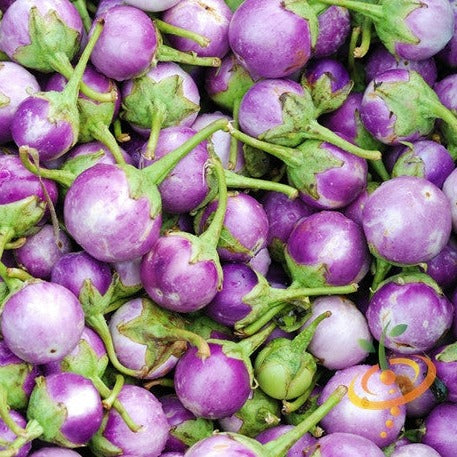























































 Plant this mix to attract beneficial insects such as ladybugs, lacewings, ground beetles and other insects that feed on pests.
Plant this mix to attract beneficial insects such as ladybugs, lacewings, ground beetles and other insects that feed on pests. 


































































































































